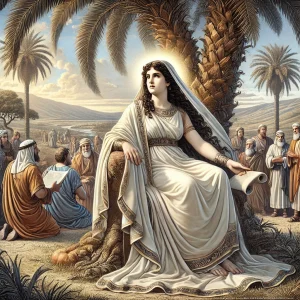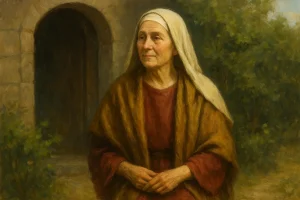Table of Contents
Throughout the Bible, we find women who played significant roles in the history of redemption. Each one was called by God to fulfill specific purposes, reflecting the qualities of faith, wisdom, and obedience. Through their lives, we not only see how God worked in them but also discover principles and lessons that remain relevant to our Christian lives today. From Eve to Mary, the mother of Jesus, these women are examples of how God’s grace and mercy extend to every aspect of life, regardless of circumstances or human limitations.
The importance of these stories lies not only in their historical context but also in how they reveal the character of God and His relationship with His people. These women faced difficulties, temptations, and trials, but God guided, redeemed, and used them to accomplish His eternal purpose. Their lives are proof that God’s transforming power can work in anyone who places their faith in Him, regardless of their situation or background. By studying their lives, we learn about God’s faithfulness, His compassion, and His willingness to use the most unlikely people to carry out His will.
This article explores the lessons of faith, wisdom, obedience, and redemption that we can learn from these biblical women. Through their testimonies, we will better understand how God honors women, empowers them to fulfill His purpose, and gives them a voice in a culture that often overlooked them. We will also discover how these women reflect God’s redemptive plan and how their lives can inspire us to keep walking confidently in His ways.
God’s Mercy Toward Women
God’s mercy is a recurring theme in the Bible, especially in the lives of women. Throughout Scripture, we see women who, despite their failures and weaknesses, were objects of God’s compassion and grace. A clear example is Eve, the first woman, whose act of disobedience brought sin into the world. Despite the gravity of her sin, God did not abandon her. Instead, He promised that through her offspring, a Savior would come to crush the serpent’s head (Genesis 3:15). This promise serves as a reminder that even in the midst of sin, God already had a plan for redemption.
Another example of divine mercy is the story of Hagar, the servant of Sarah, who was cast into the desert with her son Ishmael. In her desperation, when she thought they would die of thirst, God appeared to her, showing her a well and giving her a promise for her son: that he too would become a great nation (Genesis 16:7-13; 21:15-19). This act of divine compassion shows that God hears the cries of the afflicted and cares for those who feel abandoned. Hagar, a foreign and despised woman, was blessed by the God of Israel, who showed her that her life had value and purpose.
God’s mercy is also evident in the story of Mary Magdalene, who, after being delivered from seven demons, faithfully followed Jesus until His death and resurrection (Luke 8:2). Despite her dark past, she was honored with the privilege of being the first to see the risen Christ (John 20:11-18). Mary Magdalene’s redemption shows that no matter how great the sin or spiritual oppression, God’s mercy is enough to bring freedom and restoration. In His grace, God not only restores but also gives a place of honor to those who, like Mary, trust in Him.
The Importance of Obedience to God
Obedience is a key theme in the lives of many women in the Bible. Through their stories, we see that the willingness to follow God’s will is rewarded with blessings and divine protection. A notable example is Ruth, a Moabite woman who chose to follow her mother-in-law Naomi and the God of Israel, despite having lost her husband. Ruth said, “Your people will be my people, and your God will be my God” (Ruth 1:16). Through her obedience, Ruth not only found a new home but was also blessed with a godly husband, Boaz, and became an ancestor of King David and, ultimately, the Messiah.
Mary, the mother of Jesus, is perhaps the most well-known example of obedience to God. When the angel Gabriel appeared to her and told her she would bear the Son of God, Mary, despite her fears and uncertainties, accepted the divine calling, saying, “I am the Lord’s servant. May your word to me be fulfilled” (Luke 1:38). Her obedience allowed God’s redemptive plan to unfold, bringing the Savior into the world. Through Mary, we learn that true obedience involves surrendering to God’s will, even when we don’t fully understand what He is doing in our lives.
Another woman who exemplifies obedience is Deborah, a prophetess and judge in Israel. Deborah obeyed God’s call to lead her people in a time of war. Despite the challenges, she trusted that God would give her victory over their enemies. Under her leadership, the people of Israel won a great victory over the Canaanites (Judges 4:4-16). Deborah teaches us that obedience to God is not always easy but is always rewarded. When we trust His commands, even in the midst of difficulties, God grants us the wisdom and courage to fulfill His will.
The Faith and Wisdom God Gives Women to Live Piously
The Bible is also full of examples of women whose faith and wisdom enabled them to live piously despite difficult circumstances. Hannah, the mother of Samuel, is a clear example of a woman whose faith in God led her to persevere in prayer, despite her suffering from being unable to have children. Rather than becoming bitter, Hannah poured out her heart before God in the temple, asking for a son and promising to dedicate him to God’s service (1 Samuel 1:9-20). God heard her prayer, and Hannah kept her promise by giving Samuel to serve in the temple. Hannah’s faith teaches us that, even when our prayers are not immediately answered, God is faithful to fulfill His promises.
Esther, the young queen of Persia, is also an impressive example of faith and wisdom. When her people, the Jews, faced annihilation, Esther, despite the danger, decided to intercede before the king. Her courage and wisdom in approaching the king prudently resulted in the salvation of the Jews (Esther 4:15-16). Esther not only acted in faith in God’s plan, but she also displayed great wisdom in carefully planning how to address the situation. Her story reminds us that faith and wisdom go hand in hand and that God grants wisdom to those who trust in Him.
Sarah, the wife of Abraham, is also an example of how faith in God’s promises can overcome doubts and obstacles. Although she initially doubted when God promised her a son in her old age, she ultimately saw the fulfillment of that promise when she gave birth to Isaac (Genesis 21:1-3). Through her story, we learn that God always keeps His promises, regardless of our doubts or how impossible the circumstances may seem. Sarah’s wisdom is evident in her willingness to wait for God’s perfect timing, trusting that He is faithful.
The Honor Christ Gave to Women
Throughout His ministry, Jesus broke the cultural norms of His time by honoring and dignifying women in unprecedented ways. A clear example is His interaction with the Samaritan woman at the well of Sychar. Despite the social and religious barriers that separated Jews and Samaritans, and the marginalization of this woman due to her past, Jesus spoke to her with compassion and respect, revealing His identity as the Messiah (John 4:1-26). This encounter transformed the woman, who immediately became a bold witness for Jesus, bringing many from her town to faith in Him.
Jesus also showed His compassion and mercy toward the woman caught in adultery, who was about to be stoned for her sins (John 8:1-11). Instead of condemning her, Jesus forgave her, challenging her accusers with the famous words, “Let any one of you who is without sin be the first to throw a stone at her.” This act of forgiveness and grace not only saved the woman’s life but also gave her a new opportunity to live in holiness. Jesus defied the social and religious expectations of His time, demonstrating that mercy triumphs over judgment and that everyone can be redeemed.
Finally, Jesus honored Mary, the sister of Lazarus, when she chose to sit at His feet and listen to His teaching rather than be preoccupied with household chores (Luke 10:38-42). Although her sister Martha complained that Mary was not helping, Jesus praised Mary’s decision, saying that she had “chosen what is better.” With this gesture, Jesus showed that spiritual learning was accessible to both men and women, breaking traditional norms and demonstrating that the desire to know God is of the utmost value. This act reaffirms the worth of devotion and learning, regardless of gender.
Testimonies of Women in the Bible
We have already talked about some of these women based on their example in different topics, now we are going to look at each of them in particular:
Eve

Eve, the first woman created by God, is an example of how human decisions can have eternal consequences. Eve was deceived by the serpent and ate from the tree of the knowledge of good and evil, bringing sin into the world (Genesis 3:1-6). Despite her disobedience, God did not abandon her. In His judgment, He also gave a promise of redemption: that her offspring would crush the serpent’s head, a reference to Christ (Genesis 3:15). Eve reminds us that while sin has consequences, God always offers hope and a plan for redemption.
Even though Eve introduced sin into the world along with Adam, she also serves as an example of God’s restoration amid chaos. Through the promise of redemption, we see how Eve became the first of many women whose role in humanity’s history was key in God’s divine plan for restoration. Her story reminds us that while our decisions may lead us away from God, His mercy is always available to guide us back. As the mother of all, Eve’s life also highlights the vital role women play in creation and in God’s redemptive plan.
Sarah

Sarah, the wife of Abraham, is an example of how faith in God’s promises can overcome human doubts. Despite being barren and laughing when God promised her a child in her old age, Sarah eventually saw that promise fulfilled when she gave birth to Isaac (Genesis 21:1-3). Though she attempted to take matters into her own hands by offering her servant Hagar to Abraham, her story teaches us that God’s plan doesn’t depend on our manipulations but on His faithfulness. Through Sarah, we see that God always keeps His promises, even if the path to them isn’t what we expect.
Sarah is also an example of how faith can grow over time. Despite her initial moments of doubt, her trust in God strengthened, and she eventually saw God’s promise come to fruition. This reminds us that faith doesn’t have to be perfect from the beginning, but as we learn to trust God more, our doubts are transformed into confidence. Sarah’s story also highlights the importance of waiting on God’s timing, knowing that He always fulfills His promises, even when everything seems impossible from a human perspective.
Miriam

Miriam, the sister of Moses, played a crucial role in the liberation of the Israelites from slavery in Egypt. She watched over her brother as he floated in a basket down the Nile River, ensuring that Pharaoh’s daughter would find him (Exodus 2:4-10). Later, Miriam became a prophetess and led the women of Israel in a song of praise after God parted the Red Sea for the Israelites to cross on dry land (Exodus 15:20-21). Though she had moments of weakness, such as when she questioned Moses’ authority (Numbers 12:1-15), her life teaches us about the importance of spiritual leadership and worshiping God.
In addition to being a spiritual leader and prophetess, Miriam was a model of courage. From a young age, she showed her ability to make quick, effective decisions by saving her brother Moses, who later became Israel’s deliverer. Her willingness to lead the women in praise after the Red Sea’s deliverance demonstrates her ability to inspire others to recognize God’s hand in their lives. Although Miriam faced challenges, her legacy endures as an inspiring leader in Israel’s history.
Deborah

Deborah, a judge and prophetess in Israel, is one of the most notable examples of female leadership in the Bible. At a time when Israel was oppressed by their enemies, Deborah, under God’s direction, led the army of Israel to victory against the Canaanites (Judges 4:4-16). Through her wisdom and faith, Deborah not only guided her people in times of crisis but also demonstrated that women can be called by God to lead in crucial moments. Her story teaches us that when we trust in God, He equips us to overcome any challenge.
In addition to being a military leader, Deborah served as a judge, showing her ability to resolve disputes and lead her people with justice. Her example teaches us that female leadership has an important place in God’s plan and that women can be used to guide His people in times of need. Deborah not only trusted God for victory but also inspired others to follow God’s will with courage, like the commander Barak, who was only willing to go into battle if Deborah went with him.
Ruth

The story of Ruth is a touching example of loyalty and redemption. After the death of her husband, rather than returning to her people, Ruth decided to stay with her mother-in-law Naomi and follow the God of Israel (Ruth 1:16). Through her obedience and humility, Ruth was redeemed by Boaz, and her story culminates with the birth of her son Obed, who would become the grandfather of King David (Ruth 4:13-17). Ruth teaches us that God honors faithfulness and that His plan for redemption is available to everyone, regardless of their background or circumstances.
Ruth’s decision to leave everything behind to follow Naomi was an act of courage and faith that not only changed her life but also had a significant impact on the history of salvation. Her willingness to work hard and trust in God’s providence, even in the midst of poverty, shows her godly character and devotion to the Lord. Ruth also teaches us the importance of redemption, not only spiritually but also in how God provides for our physical and emotional needs through His sovereign plan.
Esther

Esther, a young Jewish woman who became queen of Persia, is a model of courage and faith. When her people were threatened with annihilation, Esther risked her life to intercede before the king, saying, “If I perish, I perish” (Esther 4:16). Through her bravery and wisdom, God used Esther to save her people from destruction. Her story reminds us that God places His servants in strategic positions to fulfill His purpose and that the courage to do what is right is always rewarded.
In addition to her bravery, Esther’s story also teaches us the importance of spiritual preparation before facing a crisis. Before interceding with the king, Esther asked that her entire people fast and pray for three days, showing that her dependence was on God and not solely on her position as queen. Esther is an example of how faith in God can give us strength and courage in moments of great challenge, and how God can use even the most unlikely situations to fulfill His divine purpose.
Hannah

Hannah, the mother of Samuel, is an example of a woman of deep faith and devotion to God. After years of suffering from infertility, Hannah prayed fervently to the Lord, asking for a son and promising to dedicate him to His service (1 Samuel 1:10-11). God answered her prayer, and Hannah kept her promise by giving Samuel to serve in the temple (1 Samuel 1:27-28). Hannah’s life teaches us the power of persistent prayer and the importance of fulfilling our vows to God. Despite her deep pain, Hannah’s faith never wavered, and her example shows that God is faithful to His promises when we remain faithful in our prayers.
Rahab

Rahab, a prostitute in Jericho, is an astounding example of redemption and courage. Despite her past, Rahab showed extraordinary faith in the God of Israel when she protected the spies sent to explore the land of Jericho (Joshua 2:1-21). Rahab recognized that the God of Israel was the true God, and through her faith, not only was she saved, but her entire family was spared during Jericho’s destruction. Her story demonstrates that God honors faith, no matter a person’s past or circumstances.
The impact of Rahab’s faith didn’t end with the salvation of her family; she later became an integral part of the people of Israel and was notably included in the genealogy of Jesus Christ (Matthew 1:5). This underscores the extent of God’s redemption: Rahab went from being a marginalized woman to becoming part of the lineage of the Messiah. Her life is a powerful reminder that God can transform our lives and give us a purpose far beyond what we could ever imagine. Rahab’s story is a lesson in how faith in the one true God can bring not only physical salvation but also spiritual redemption and a new destiny.
Rahab’s courage also teaches us about the importance of trusting in God’s promises, even when doing so puts us at odds with our past or our culture. By hiding the spies and declaring her faith in the God of Israel, Rahab risked her life but gained eternal significance through her actions. Her story highlights that no one is beyond the reach of God’s grace, and that even the most unlikely individuals can be used to further His plan of salvation. Rahab shows us that redemption is available to all who believe, and that faith in God has the power to change the course of history.
Mary, Mother of Jesus

Mary, the mother of Jesus, is perhaps one of the most revered figures in the Bible, not only for being the mother of the Savior but for her willingness to accept God’s will despite the personal and social implications. When the angel Gabriel announced to her that she would bear the Son of God, Mary responded with humility and obedience: “I am the Lord’s servant. May your word to me be fulfilled” (Luke 1:38). Her life is a testament to how faith and submission to God’s will can allow Him to fulfill His plans through us.
Mary also teaches us the value of reflection and patience. Throughout her life, Mary “treasured up all these things and pondered them in her heart” (Luke 2:19). Despite the magnitude of her calling, she did not seek fame or glory but trusted that God would carry out His plan in His perfect timing. Her life is marked by humility and trust, and through her example, we learn to trust in God’s plans, even when we don’t fully understand them. Mary reminds us that spiritual greatness lies in a heart willing to follow God obediently.
Mary’s role in Jesus’ life didn’t end with His birth. She was present at pivotal moments in His ministry, from His first miracle at the wedding in Cana (John 2:1-11) to standing at the foot of the cross during His crucifixion (John 19:25). Her unwavering support and quiet faith in God’s plan highlight her deep spiritual insight and resilience. Through Mary, we learn that faith is not passive but involves active trust and participation in God’s redemptive work.
Mary Magdalene

Mary Magdalene is a powerful example of redemption and devotion. Delivered from seven demons by Jesus, Mary became one of His most faithful followers, accompanying Him throughout His ministry and being present at His crucifixion (Luke 8:2). After Jesus’ death, she was the first to see the risen Christ and bring the message of His resurrection to the disciples (John 20:11-18). Mary Magdalene’s life shows us that Jesus’ love and mercy can transform lives, and that He entrusts important tasks to those who remain faithful to Him.
Mary Magdalene’s story also teaches us the power of gratitude and devotion. Having been freed from a life of spiritual bondage, her love for Jesus became so deep that she remained by His side until the end, even when others fled. Her loyalty was rewarded with the incredible honor of being the first witness of the resurrection, highlighting the value Jesus placed on her faithfulness and love. Mary Magdalene’s life is a reminder that God sees our devotion and entrusts us with significant roles when we remain faithful to Him, no matter what trials we face.
Her transformation from a woman oppressed by demonic forces to a faithful disciple of Jesus illustrates the profound change that occurs when we encounter God’s grace. Mary Magdalene is a symbol of how Christ’s redemption extends to all areas of life, and her life demonstrates that those who have been forgiven much, love much. Through her testimony, we see the importance of clinging to Christ in all circumstances and spreading the good news of His resurrection.
Priscilla

Priscilla, alongside her husband Aquila, was a leader in the early church and a notable example of how women can play key roles in ministry. Known for her deep understanding of Scripture, Priscilla helped guide and correct Apollos, an eloquent preacher who was unaware of certain aspects of the gospel (Acts 18:24-26). Her story is a testament to how God uses women to teach and lead others in the truth of the gospel. Priscilla’s life shows that women have a vital role in the growth and strengthening of the church.
Priscilla and Aquila also opened their home to host the church, reflecting their willingness to serve and support the Christian community (1 Corinthians 16:19). Their example of hospitality and leadership is a lesson for all believers about the importance of using our gifts and resources for ministry. Through her life, Priscilla teaches us that knowledge and teaching God’s truth are not limited by gender, and that we are all called to be witnesses and teachers of the gospel, serving God faithfully.
Moreover, Priscilla’s partnership with her husband in ministry provides a model of how married couples can work together in serving God. Together, they were tentmakers and missionaries, showing that ministry happens both in everyday work and in intentional spiritual service. Through their example, we see that hospitality, teaching, and support are critical components of a thriving church, and Priscilla’s role underscores the influence that women can have in shaping the faith of future leaders.
Lydia

Lydia, a dealer in purple cloth from Philippi, was the first person in Europe to become a Christian after hearing Paul’s message (Acts 16:14-15). As a successful businesswoman, Lydia used her influence and resources to support the growth of the early church, offering her home as a meeting place for the first Christians in Philippi. Her willingness to open her home and support the church reflects her deep commitment to the faith. Through Lydia, we see that the gospel not only changes hearts but also transforms communities through service and hospitality.
Lydia’s story also teaches us about the importance of spiritual receptivity. The Bible says that “the Lord opened Lydia’s heart to respond to Paul’s message” (Acts 16:14). This act of God in her life reminds us that faith is a gift that God bestows, and that our response to that gift is crucial. Lydia’s life shows how a positive response to the gospel can have a lasting impact on a community. Her example encourages us to be open to the opportunities God gives us to serve and support the growth of His kingdom.
Moreover, Lydia’s hospitality extended beyond merely providing a place for worship. Her home became a central hub for the early Christian community, allowing the fledgling church to grow and thrive. Lydia’s willingness to use her resources for God’s work demonstrates how each believer, regardless of their status or occupation, can contribute to the spread of the gospel. Her story highlights the transformative power of God’s grace and the impact that one person’s faith can have on the wider church.
Eunice and Lois

Eunice and Lois, the mother and grandmother of Timothy, respectively, are noteworthy examples of how faith can be passed down through generations. These two devout women deeply influenced Timothy, who would go on to become a key leader in the early church (2 Timothy 1:5). The sincere faith shared by Eunice and Lois played a fundamental role in shaping Timothy’s spiritual life, preparing him for ministry. Their lives teach us that the impact of a lived and transmitted faith can have a lasting effect on future generations.
The influence of Eunice and Lois also reminds us of the importance of teaching the faith at home. While there are few details about their lives, what we do know is enough to show that both women were faithful in instructing Timothy in the Scriptures from an early age (2 Timothy 3:15). This had a lasting impact on his life and ministry, highlighting the power of faith-based upbringing. Eunice and Lois’s story teaches us that the spiritual formation of children and grandchildren is a sacred responsibility and that God uses parents and grandparents to guide future generations in the way of faith.
Their example also emphasizes the role of women in passing down theological knowledge and instilling godly character. Timothy’s ministry was built on the foundation of the teaching and nurturing he received from these women. Through their faithfulness, they equipped Timothy with the tools he needed to spread the gospel and disciple others. Eunice and Lois remind us that spiritual mentorship begins at home and that the seeds of faith we plant in the lives of those we mentor can grow into a powerful legacy for the church.
Hagar
Hagar, Sarah’s servant, was cast out into the desert with her son Ishmael, but God found her in her moment of greatest need. In her despair, God showed her a well of water and promised that her son would also become a great nation (Genesis 16:7-13; 21:15-19). Hagar’s story teaches us that God sees and cares for the oppressed and that He always has a plan for the marginalized. Despite her status as a servant and her difficult family situation, Hagar experienced God’s presence and intervention in a deeply personal way.
After fleeing from Sarah, an angel of the Lord appeared to Hagar, giving her comfort and a promise for her son, Ishmael. This shows that God does not forget the marginalized or those who suffer. The name Hagar gives to God during this encounter, “El-Roi,” meaning “the God who sees me” (Genesis 16:13), reveals a profound truth: God is aware of our struggles and is present even in the most desperate times. Hagar’s story also teaches us about the importance of trusting God in seemingly hopeless situations.
Elizabeth

Elizabeth, the mother of John the Baptist, was a righteous and devout woman who received a miraculous blessing when she became pregnant in her old age. For many years, Elizabeth had been barren, which in her time was seen as a social disgrace. However, God heard her prayers, and she conceived John, who would prepare the way for Jesus’ ministry (Luke 1:5-25). Elizabeth’s life teaches us that God is in control of our timing and that, when we least expect it, He can perform miracles in our lives.
Leah

Leah, the older sister of Rachel, lived a life marked by rejection since Jacob loved Rachel more. Despite her unfavorable position, God blessed Leah with many children, including Judah, from whose lineage the Messiah would come (Genesis 29:31-35). Even though she didn’t receive Jacob’s full love, Leah experienced God’s favor, who compensated for her lack of marital affection by blessing her with motherhood and a crucial place in His plan for redemption. Leah is an example of how God can transform difficult circumstances into blessings that have eternal significance.
Rachel

Rachel, Jacob’s favored wife, is known for both her beauty and her deep desire to become a mother. Despite winning Jacob’s love, Rachel suffered greatly from infertility, and her rivalry with her sister Leah became a source of great pain (Genesis 30:1). However, God heard Rachel’s prayers and eventually granted her heart’s desire by giving her a son, Joseph, who later played a crucial role in the history of Israel (Genesis 30:22-24). Rachel’s story teaches us that God hears our prayers and that His blessings arrive at the right time.
Jochebed

Jochebed, the mother of Moses, demonstrated extraordinary faith by hiding her son for three months to protect him from Pharaoh’s decree to kill all Hebrew male babies. When she could no longer hide him, Jochebed entrusted her son to God’s providence, placing him in a basket in the Nile River (Exodus 2:1-10). Her bravery and trust in God not only saved Moses’ life but also allowed him to be raised in Pharaoh’s household, preparing him to lead Israel’s liberation from slavery. Jochebed’s life teaches us that faith in God enables us to make courageous decisions in the face of danger.
Shiphrah and Puah

Shiphrah and Puah were two Hebrew midwives who courageously defied Pharaoh’s orders to kill all male Hebrew babies at birth (Exodus 1:15-21). Fearing God more than Pharaoh, these women risked their lives by disobeying the king’s orders, saving countless babies, including Moses. Their bravery and obedience to God teach us that God’s justice must always prevail over human injustice and that when we obey God over human authorities, He protects and rewards us.
Conclusion
Each of these women in the Bible offers a unique testimony of God’s grace, faith, and wisdom. From the heroic decisions of Shiphrah and Puah to the deep devotion of Hannah, their stories show us that, no matter the circumstances, God uses women from all backgrounds to fulfill His eternal purpose. Through their faith, obedience, and courage, these women not only impacted their time but also left us with timeless lessons about the importance of trusting God in the midst of trials.
The power of redemption is a central theme in all these stories. Women like Rahab and Leah remind us that, even in difficult situations and when we are rejected by the world, God sees our value and can transform our story. Mothers like Hannah, Jochebed, and Rachel teach us the power of prayer and perseverance, while leaders like Deborah and Esther inspire us to follow God’s ways with courage and determination.
As we study these lives, we are encouraged to follow their examples of faith and trust in God. Just as He worked wonders in their lives, He can do the same in ours. When we surrender our lives to His will and trust His plan, God uses us in powerful ways to fulfill His purpose, just as He did with these women of faith in the Bible.


